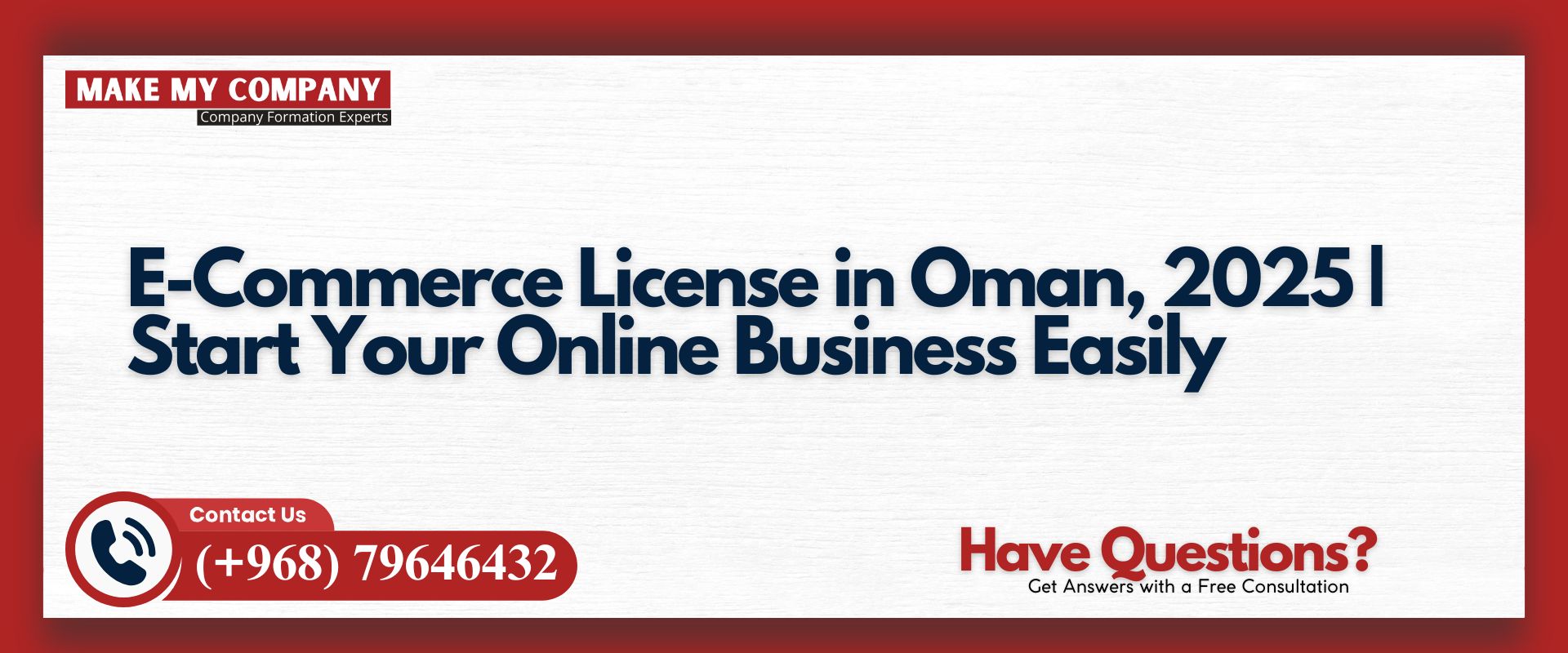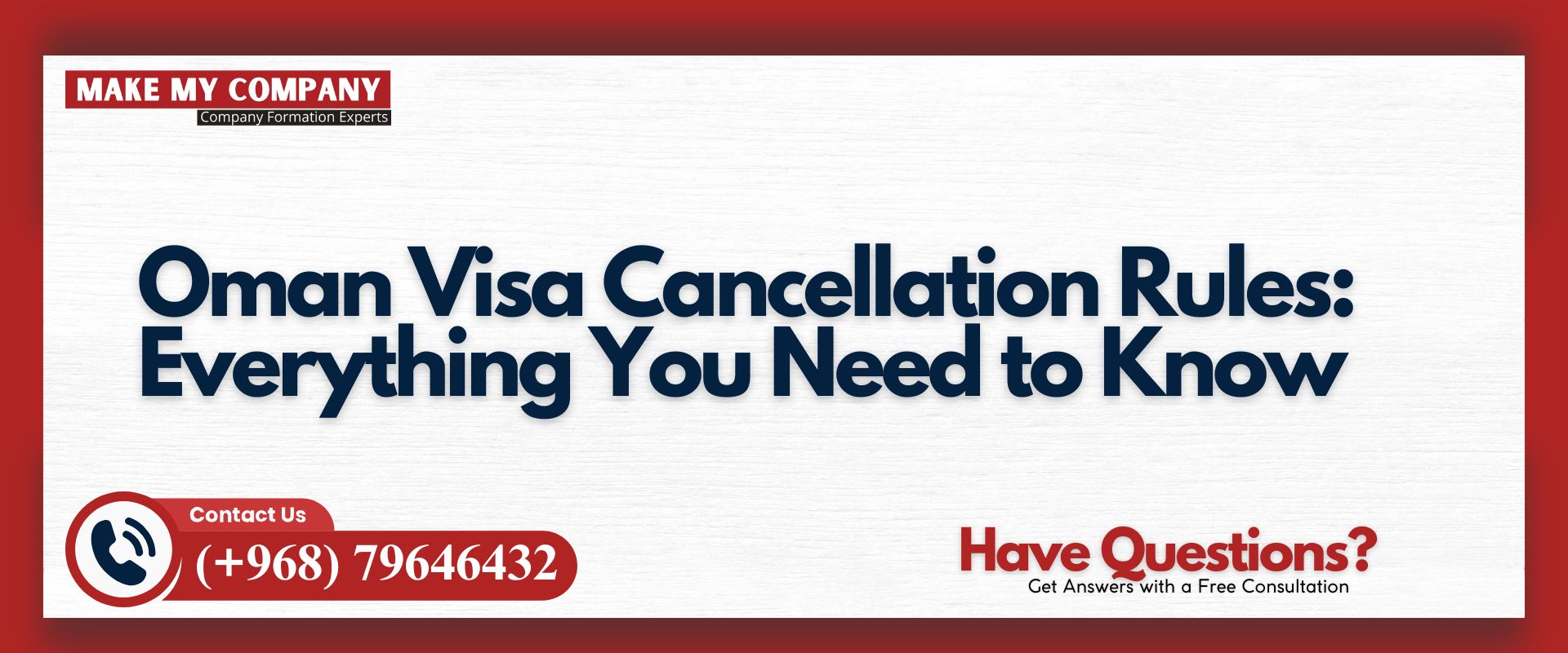Written by: Shuja Ahmad
Oman Business Registration Specialist
Last Updated: February, 2026
Information based on the Ministry of Commerce, Industry, and Investment Promotion (MOCIIP) current regulations
Starting an ecommerce business in Oman requires company registration with MOCIIP, ecommerce license approval, municipal authorization, and payment gateway integration. Whether selling physical products, digital services, or operating dropshipping models, you must obtain proper commercial Registration and ecommerce licensing before accepting online payments or processing customer orders.
This guide explains the complete ecommerce company registration process, license requirements, costs, and compliance for 2026.
Table of Contents
Quick Facts: E-Commerce License in Oman 2026
Licensing Authority:
- Ministry of Commerce, Industry and Investment Promotion (MOCIIP)
- Royal Oman Police (ROP) – if importing products
- Central Bank of Oman (CBO) – payment regulation
Commercial Registration Required:
- Yes – mandatory before ecommerce operations
- Choose: Sole Proprietorship, LLC, or Free Zone company
E-Commerce License:
- Separate authorization from MOCIIP
- Required for online sales and payment processing
- Must display CR number on website
Minimum Capital:
- Sole Proprietorship: No minimum (typically OMR 1,000-2,000)
- LLC Mainland: Activity-dependent (many activities now have no fixed minimum)
- Free Zone LLC: OMR 500-1,000 minimum
Foreign Ownership:
- Mainland LLC: Requires an Omani partner OR 100% in certain sectors
- Free Zone: 100% foreign ownership allowed
- Sole Proprietorship: GCC nationals only
Office Requirement:
- Physical address mandatory (office, virtual office, or approved home-based)
- Virtual office: OMR 100-300/month accepted
Processing Time:
- Commercial Registration: 5-10 days
- E-commerce license: 3-7 days after CR
- Total: 2-3 weeks typical
Government Costs:
- Trade name: OMR 50-100
- CR registration: OMR 200-500
- E-commerce license: OMR 100-300
- Municipality: OMR 100-300
- Total: OMR 450-1,200
Is E-Commerce Allowed in Oman for Foreigners?
Foreign Ownership Rules for Online Business
Yes – foreigners can start ecommerce businesses in Oman through:
Option 1: Free Zone Companies (100% Foreign Ownership)
- Salalah Free Zone
- Sohar Free Zone
- Duqm Special Economic Zone
- Al Mazunah Free Zone
Advantages:
- 100% foreign ownership
- No Omani sponsor required
- Lower capital requirements (OMR 500-1,000)
- Tax incentives
- Simplified Registration
Limitations:
- Can only sell to customers outside the free zone (export focus) OR pay additional fees for local market access
- Cannot directly deliver to the Omani mainland without proper authorization
- May require separate mainland registration for local ecommerce
Option 2: Mainland LLC with 100% Foreign Ownership
MOCIIP allows 100% foreign ownership in:
- E-commerce retail (specific product categories)
- Digital services
- Online marketplace platforms
- Software as a Service (SaaS)
Requirements:
- Minimum investment varies by activity
- Must meet sector-specific requirements
- MOCIIP approval required
- Some restrictions on retail categories
Option 3: Mainland LLC with Omani Partner
Traditional structure:
- 70% foreign + 30% Omani ownership minimum
- The Omani partner is typically passive
- Partner agreement essential
- Applies to retail activities not covered under 100% foreign ownership
GCC Nationals:
- Can establish a sole proprietorship
- Treated as Omani nationals for ownership
- No partnership required
E-Commerce License Oman Requirements 2026
Who Needs an E-Commerce License?
Mandatory for:
- Selling products online to Oman customers
- Accepting online payments through website/app
- Operating a digital marketplace connecting buyers and sellers
- Dropshipping to Oman addresses
- Subscription-based digital services
- Online food delivery platforms
Not Required for:
- Social media selling without a payment gateway (subject to scale)
- Offline sales only
- International ecommerce not targeting Oman
- Pure service provision without online transactions
MOCIIP E-Commerce Authorization
License Covers:
- Legal authorization for online sales
- Permission to integrate payment gateways
- Protection under the consumer rights framework
- Ability to advertise as a registered business
License Conditions:
- Valid Commercial Registration active
- Website/platform operational or planned
- Terms & Conditions are compliant with consumer protection
- Privacy policy meets data protection standards
- Clear refund/return policy displayed
- Contact information prominently shown
Step-by-Step E-Commerce Company Registration Process in Oman
Step 1: Choose Business Structure
Sole Proprietorship (GCC Nationals Only):
- Simplest structure
- The owner has unlimited liability
- No minimum capital requirement
- Lower registration costs (OMR 450-800 total)
- Cannot have partners
Limited Liability Company (LLC):
- Limited liability protection
- Can have 2-50 shareholders
- Foreign ownership possible (with conditions)
- More credible for B2B ecommerce
- Higher setup costs (OMR 1,000-3,000)
Free Zone Company:
- 100% foreign ownership
- Tax advantages
- Requires a free zone office/license
- Limited mainland market access
- Setup: OMR 2,000-5,000
Step 2: Reserve Trade Name
Process:
- Search name availability on the MOCIIP portal
- Submit name reservation request
- Pay OMR 50-100 reservation fee
- Receive approval (1-3 days)
Requirements:
- Unique name in the chosen sector
- Arabic translation required
- No religious/governmental references
- Not similar to existing trademarks
- Check domain availability simultaneously
Step 3: Secure Business Address
Options:
Virtual Office:
- Cost: OMR 100-300/month
- Provides: Business address, mail handling
- Accepted by MOCIIP for ecommerce
- No physical workspace included
Physical Office:
- Cost: OMR 200-600/month
- Required if storing inventory
- Needed for warehouse operations
- Municipal approval for commercial use
Home-Based Registration:
- Possible in some cases
- Requires homeowner consent
- Municipal restrictions may apply
- Verify eligibility with MOCIIP
Step 4: Prepare Required Documents
For Omani/GCC Citizens:
- Valid civil ID
- Passport copy
- Proof of business address
- Bank account details
- Business plan (for ecommerce activity)
For Foreign Investors (LLC):
- Valid passport (6+ months validity)
- Residence visa copy (if in Oman)
- Emirates ID (if UAE resident)
- Passport-sized photos
- Educational certificates (attested)
- Previous business registration (if applicable)
- Partnership agreement (if multiple shareholders)
- Minimum capital proof
Step 5: Submit Commercial Registration Application
Via MOCIIP Portal (invest.oman.om):
- Create an account on the Invest Easy platform
- Select business activity (ecommerce retail/services)
- Upload required documents
- Pay registration fees
- Submit application
Activity Codes for E-Commerce:
- 47911: Online retail (general merchandise)
- 47919: Online retail (specialized products)
- 63120: Web portals and marketplace platforms
- 62090: IT services and digital products
Processing: 5-10 working days
Fees:
- Trade name: OMR 50-100
- Commercial Registration: OMR 200-500 (varies by activity/structure)
Step 6: Apply for E-Commerce License
Submit to MOCIIP:
- Commercial Registration certificate
- Website URL or platform details
- Product category list
- Payment gateway provider details
- Terms & Conditions draft
- Privacy policy document
- Return/refund policy
- Customer service contact details
Processing: 3-7 days after CR approval
Fee: OMR 100-300 depending on business scale
Step 7: Obtain Municipal Approval
Register with Municipality:
- Submit the CR copy
- Business address proof
- Activity description
- Floor plan (if physical location)
Fee: OMR 100-300 annually
Processing: 3-5 days
Step 8: Register for Tax (If Applicable)
Oman Tax Authority:
- Register if turnover exceeds the threshold
- Corporate tax applies (currently suspended for most SMEs)
- VAT not yet implemented in Oman (as of 2026)
- Maintain proper accounting records
Step 9: Set Up Payment Gateway
CBO-Approved Payment Providers:
Thawani:
- Omani-focused solution
- OMR currency support
- 2.5-3.5% transaction fee
- Setup: OMR 0-200
- Integration: Easy
PayPal:
- International payments
- Limited OMR support
- 3.9% + OMR 0.150 per transaction
- Requires a business account
Stripe:
- Global payment processing
- Not directly available in Oman (use via UAE entity)
- Alternative for international sales
Bank Payment Gateways:
- Bank Muscat
- National Bank of Oman
- Ahli Bank
- 2-4% transaction fees
Application Requirements:
- Commercial Registration
- E-commerce license
- Business bank account
- Website URL
- Processing: 1-2 weeks
Step 10: Launch Website/Platform
Website must display: CR number, e-commerce license number, business address, contact details, Terms & Conditions, Privacy policy, Return/refund policy, pricing in OMR with all fees, and delivery timeframes.
Can I Start Dropshipping in Oman?
Dropshipping License Requirements
Yes – dropshipping is allowed in Oman with proper licensing.
Legal Requirements:
- Commercial Registration (mandatory)
- E-commerce license from MOCIIP
- Import considerations if the supplier ships from abroad
- Consumer protection compliance
- Clear refund policies
Dropshipping Business Structure:
How It Works:
- You register an Omani ecommerce company
- Create an online store with products
- Customers order and pay on your site
- You forward orders to the supplier
- Supplier ships directly to the customer
- You handle customer service and returns
Advantages:
- No inventory investment
- Lower startup costs (OMR 1,500-3,000 total setup)
- Flexible product range
- Scalable quickly
Challenges:
- Longer delivery times (if international suppliers)
- Less control over quality
- Customs clearance responsibilities
- Return/refund complexity with international suppliers
Dropshipping CR Activity:
- Register as an online retailer (activity code 47911 or 47919)
- E-commerce license covers dropshipping operations
- Specify “online retail without physical inventory” in the application
Import Considerations:
- ROP customs clearance for products entering Oman
- The customer is responsible for customs duties on delivery
- Ensure the supplier can ship to Oman legally
- Some product categories are restricted/prohibited
Documents Required for E-Commerce License in Oman
- Identity: Valid passport (6+ months), civil ID (Omani/GCC), residence visa (foreigners), passport photos
- Business: Trade name reservation certificate, business address proof, bank account letter, business plan
- Website: Domain registration, website URL, platform specification, hosting details
- Legal: Terms & Conditions (Arabic + English), Privacy policy, Return/refund policy
- Partnership (LLC): Partnership agreement (notarized), shareholder passports, capital proof, authorized signatory designation
- Payment: Payment gateway agreement, proposed payment methods
- Products: Product category list, supplier details, import licenses (if regulated items)
E-Commerce License Cost Breakdown Oman 2026
Government Fees (Mandatory)
| Item | Cost (OMR) |
|---|---|
| Trade name reservation | 50-100 |
| Commercial Registration | 200-500 |
| E-commerce license | 100-300 |
| Municipal approval | 100-300 |
| Total Government Fees | 450-1,200 |
Business Setup Costs (Variable)
| Item | Cost (OMR) |
|---|---|
| Virtual office (annual) | 1,200-3,600 |
| PRO services (optional) | 500-1,500 |
| Payment gateway setup | 0-500 |
| Business bank account | 100-300 |
| Website development | 500-5,000 |
| Logo and branding | 100-500 |
| Total Setup Costs | 2,400-11,400 |
Operational Costs (Monthly)
| Item | Cost (OMR/month) |
|---|---|
| Virtual office | 100-300 |
| Website hosting | 10-50 |
| Payment gateway fees | 2.5-4% per transaction |
| Marketing | 200-2,000 |
| Accounting services | 100-300 |
| Total Monthly | 410-2,650+ |
Minimum Budget Scenarios
Lean Startup (Dropshipping):
- Government fees: OMR 450-1,200
- Virtual office (1 year): OMR 1,200
- Basic website: OMR 500
- Payment gateway: OMR 200
- Total: OMR 2,350-3,100
Standard Ecommerce (Inventory):
- Government fees: OMR 450-1,200
- Virtual office: OMR 1,200
- Professional website: OMR 2,000-3,000
- Initial inventory: OMR 3,000-10,000
- Marketing budget: OMR 1,000
- Total: OMR 7,650-16,400
Mainland vs Free Zone E-Commerce Registration
Comparison
| Aspect | Mainland LLC | Free Zone Company |
|---|---|---|
| Foreign ownership | 100% in approved sectors OR 70/30 | 100% foreign ownership |
| Minimum capital | Activity-dependent (often no fixed minimum) | OMR 500-1,000 |
| Market access | Full Oman market access | Export focus; mainland access requires fees |
| Office requirement | Virtual office accepted | Free zone office required |
| Setup cost | OMR 1,500-4,000 | OMR 3,000-6,000 |
| Omani partner | Sometimes required | Not required |
| Tax benefits | Standard | Tax holidays available |
| Best for | Selling to Oman customers | International ecommerce + export |
Can I Run E-Commerce from Home in Oman?
Yes – with conditions:
- Commercial address required for CR (virtual office OMR 100-300/month accepted)
- Home address for actual operations possible
- Residential zones: Cannot operate warehouse, no signage, no customer visits, inventory storage may be prohibited
Best Approach: Register with virtual office, operate fulfillment from home (no inventory/dropshipping), use third-party logistics for inventory.
Viable Models: Dropshipping, digital products, print-on-demand, low-volume inventory stored elsewhere
Online Business Registration Oman: Foreign Investors
Complete Setup Steps:
- Choose Structure: 100% foreign ownership (approved sectors/free zone), 70/30 LLC with Omani partner, or GCC nationals sole proprietorship
- Entry Visa: Investor visa with minimum investment commitment (6-12 months validity)
- Capital Transfer: Transfer minimum capital to Omani bank, obtain certificate
- Documents: Foreign documents attested through home country MOFA → Oman embassy → Oman MOFA
- Company Registration: Submit MOCIIP application with attested documents
- Residence Visa: After CR approval, apply for investor residence visa (1-2 years renewable)
- Family Sponsorship: Sponsor spouse/children (requires OMR 600-650/month salary, attested marriage/birth certificates)
E-Commerce Activity Codes MOCIIP
Primary Codes:
- 47911 – Online retail (general merchandise) – Most common
- 47919 – Specialized online retail (niche categories)
- 47919-01 – Online clothing/footwear
- 47919-02 – Online food/beverages
- 63120 – Web portals (marketplace platforms)
- 62090 – IT services (SaaS, digital products)
Choose based on primary product category and business model (direct sales vs marketplace).
E-Commerce Website Requirements Oman
Mandatory Display:
- Commercial Registration number
- E-commerce license number
- Company legal name (Arabic + English)
- Physical address, contact phone/email
- Terms & Conditions, Privacy policy, Return/refund policy
- Pricing in OMR (all fees included)
- Delivery timeframes, Stock availability
Technical:
- SSL certificate (https://)
- Secure payment processing
- Mobile-responsive design
- Arabic language option
Payment Gateway Options for E-Commerce Oman
CBO-Approved Providers:
Thawani (Local):
- OMR native support, 2.5-3.5% fees
- Setup: OMR 0-200, Settlement: 2-7 days
Bank Muscat Gateway:
- 2.5-3.5% fees, Setup: OMR 300-500
- Requires bank account
PayPal (International):
- 3.9% + OMR 0.150 per transaction
- Limited OMR support, USD primary
Requirements: Commercial Registration, ecommerce license, business bank account, CBO compliance
Conclusion
Navigating registration procedures, regulatory compliance, and operational setup can overwhelm first-time entrepreneurs. At Make My Company, we specialize in comprehensive e-commerce business establishment throughout Oman. Our experienced team handles complete setup including business structure consultation, trade name registration, MOCIIP application processing, e-commerce license acquisition, municipal approval coordination, payment gateway facilitation, and website development support.
We understand the unique requirements of online business in Oman and provide tailored solutions matching your specific needs. Whether you’re establishing a traditional inventory-based store, marketplace platform, or innovative business model, our business setup consultants in Oman guide you through every regulatory checkpoint and operational requirement.
Our services extend beyond initial registration. We provide ongoing support including accounting and bookkeeping services, annual license renewals, tax compliance assistance, business expansion consulting, and strategic planning for growth.
Ready to launch your e-commerce venture in Oman’s thriving digital marketplace? Contact us today to receive personalized consultation on your business vision, regulatory requirements, and strategic launch plan. Our affordable packages include complete documentation support, government liaison services, and post-launch assistance ensuring your e-commerce business achieves sustainable success in Oman’s dynamic online economy.
Frequently Asked Questions
Is ecommerce license mandatory in Oman?
Yes. Anyone selling products or services online to Oman customers must obtain Commercial Registration and ecommerce license from MOCIIP. Operating without proper licensing is illegal and subject to penalties including fines and business closure.
How much does ecommerce license cost in Oman?
Government fees total OMR 450-1,200 including trade name (OMR 50-100), Commercial Registration (OMR 200-500), ecommerce license (OMR 100-300), and municipal approval (OMR 100-300). Additional setup costs for virtual office, website, and payment gateway vary.
Can foreigners start ecommerce business in Oman?
Yes. Foreigners can start ecommerce through: 1) Free zone companies (100% foreign ownership), 2) Mainland LLC with 100% foreign ownership (approved sectors), or 3) Mainland LLC with 70% foreign + 30% Omani ownership. GCC nationals can establish sole proprietorship.
Do I need office for ecommerce in Oman?
Yes. Business address required for Commercial Registration. Virtual office (OMR 100-300/month) accepted by MOCIIP for ecommerce companies. Physical office only necessary if storing inventory or requiring workspace. Home-based operations possible with virtual office registration.
Can I start dropshipping business in Oman?
Yes. Dropshipping allowed with proper licensing: Commercial Registration, ecommerce license, and consumer protection compliance. Register as online retail (activity code 47911/47919). Total setup cost: OMR 2,350-3,100. Specify “online retail without physical inventory” in application.
What is ecommerce activity code in Oman?
Primary codes: 47911 (online retail general merchandise), 47919 (specialized online retail), 63120 (web portals and marketplaces), 62090 (digital products and SaaS). Choose based on product category and business model. Specified during Commercial Registration application.
How long does ecommerce registration take in Oman?
2-3 weeks total. Trade name reservation: 1-3 days. Commercial Registration: 5-10 days. E-commerce license: 3-7 days after CR. Municipal approval: 3-5 days. Payment gateway setup: 1-2 weeks. Can be expedited with PRO services.
Is VAT required for ecommerce in Oman?
No. Oman has not implemented VAT as of 2026. No VAT registration required for ecommerce businesses. Corporate tax rules apply (currently suspended for most SMEs). Monitor Tax Authority announcements for future changes.
Legal Disclaimer:
This guide is informational based on February 2026 MOCIIP and regulatory requirements. Licensing fees and requirements change periodically. Always verify current regulations through official MOCIIP channels or authorized business setup consultants before proceeding.
About the Author:
Shuja Ahmad specializes in Oman business registration, MOCIIP licensing procedures, and ecommerce company formation, helping entrepreneurs navigate commercial registration requirements successfully.
For current MOCIIP registration requirements and ecommerce licensing procedures, visit the official Invest Easy portal (invest.oman.om) or consult authorized business setup service providers.









